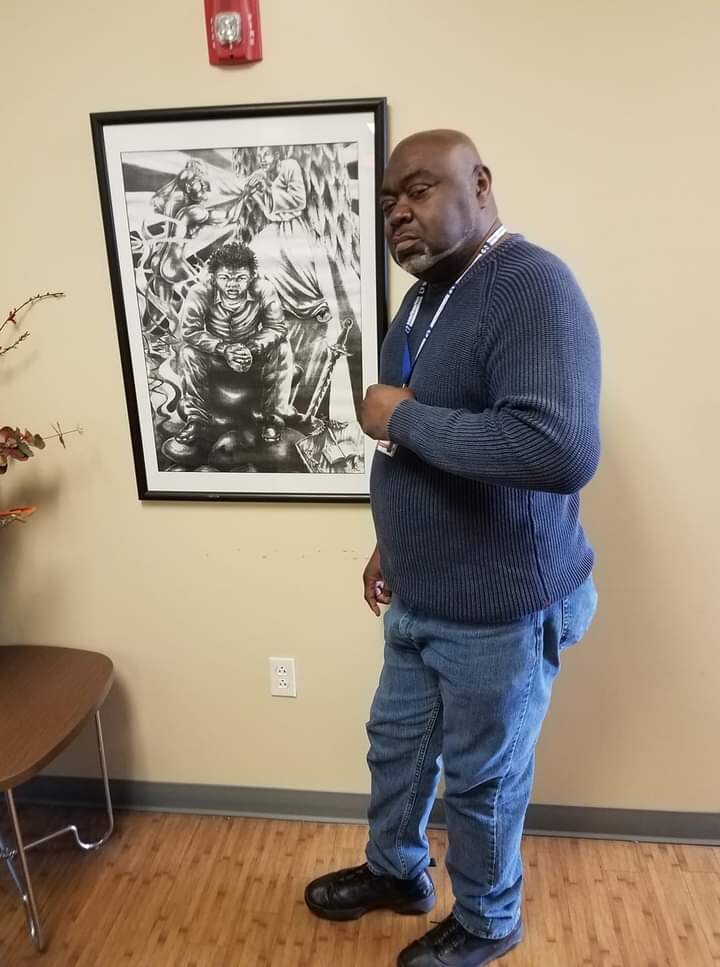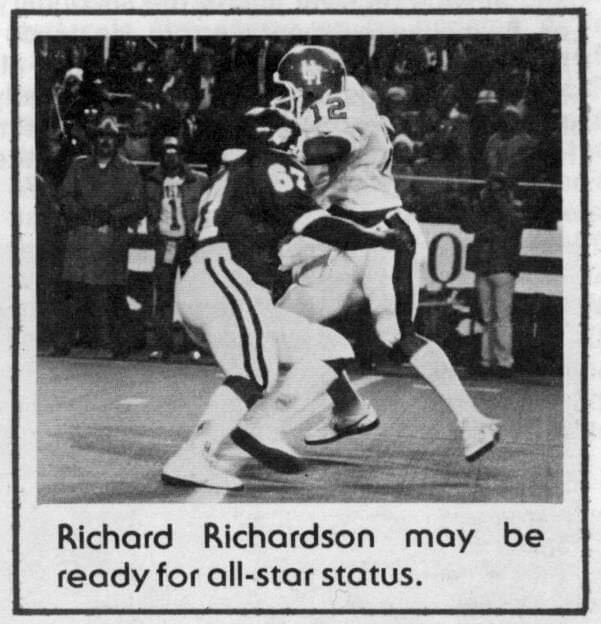Richard “Donut” Richardson
Photograph of Richard Richardson, obtained from an online Obituary created by the family.
Memorial by Tiffanie
Donut’s friend
DONUT was my VERY best friend. He came in my life in 2010 and he made it his mission to take me under his wing since I was new in little rock and all my family was hours away. We talked EVERY single day as well as saw each other whether it was in person or thru video chat. Our last conversation he begged me to leave little rock saying i was losing my soul and i was going to end up dying there but assured me I would NEVER be alone. And I am here ALL alone and stuff cuz he died 20 days later. It's been almost 16 months since he went away and my heart still breaks EVERY day. The impact he had in people's lives is something that can NEVER be found again



Photographs courtesy of Tiffanie.
Memorial by Limbo Parks
Donut’s friend
Donut was the reason I fell in love with the Arkansas Razorbacks. I remember watching him play at Razorback stadium when I was a senior in High School. His energy was special… When I became a Razorback years later after going to Coffeyville for two years I got a chance to meet him for the first time. He knew who I was and I was shocked and surprised. Richard Richardson is Razorback Royalty to and he should be in the Razorback Hall of Fame!
From Mourning Our Losses:
On January 11, 1960, Richard Lee Richardson came into the world. He was born in Little Rock, Arkansas, to Jeremiah and Lafay Neale-Richardson.
From a young age, Richard took a keen interest in football. He lived near Quigley Stadium, where the Tigers—the football team for the local Little Rock Central High School—played. When he was in seventh or eighth grade, Richard would frequently stop by the stadium to watch practices. Bernie Cox, Central’s longtime head coach, told the Arkansas Democrat Gazette that Richard “started hanging around all the time,” which was fine, “because he was a great kid, very polite.” Richard’s quiet lingerings and observations of practices soon extended to a more tactical appreciation for the game; when the coaches met on a Saturday to review the previous night’s game film and begin preparing for the next, Richard would visit, observing the discussion of strategy and supplementing his hunger for football with a donut or two from the dozens that Mr. Cox would bring into the office for the staff.
Richard’s characteristic visits and snacking earned him the nickname “Donut,” one which would stick for many years—even after, to no one’s surprise, Richard’s observation of football turned to participation and he himself became a Tiger. At Little Rock Central High School, Richard became a star player. As Mr. Cox recalled in an interview with the Gazette, “He had great strength and he had quickness. I loved him at nose guard because he knew how to get low and he could explode upward so fast.”
Photograph of Richard Richardson as a Little Rock Central High Tiger, obtained from an online obituary created by the family.
In his junior and senior years, in an ironic coming-full-circle moment, Richard was often asked to observe, rather than participate in, practice. This time, however, it was because Richard was so dominant that the coaches had no choice but to put him on the sideline so that the offense could run its plays. As a senior, Richard helped the Tigers win the 1978 Class 5A State Championship.
“I coached 44 years in high school,” recalled Mr. Cox, “and we had some great players, but none of them had a better heart or cared more about the game of football and his teammates than Richard Richardson.”
Though the countless scholarship offers that flooded in were no surprise to anyone, Richard had his heart set on one school: the University of Arkansas. As his family recalls in his online obituary, Richard’s “only wish was to play for the Arkansas Razorbacks.” His “quickness and strength,” they wrote, “caught the eye of the infamous Lou Holtz,” the Arkansas head coach, who recruited him.
Photograph of Richard Richardson as a Razorback for Arkansas, obtained from an online Obituary created by the family.
Richard was a dominant defensive lineman during his four-year tenure with the Razorbacks. In his sophomore season, Richard led the team in tackles; as a senior, he was named to the Southwest Conference all-conference team.
Following an unfortunate knee injury that abruptly ended his football days, Richard returned home and completed his studies at Philander Smith College. After a tough battle with addiction, Richard committed his life to helping those in recovery, using his kindness, inspiring work ethic, and generosity—all of which were lauded during his time on the field—in a new and moving capacity.
Richard was hired as a supervisor at the Central Arkansas Community Corrections, and he soon became an integral part of their staff. As in football, his co-workers were impressed by Richard’s high-quality and hard work.
On his obituary page, Arlene Williams, who worked for three years with Richard at Better Community Development, Inc. (an organization whose mission is to improve the quality of life for individuals and families in Little Rock, Arkansas), described Richard as “a co-worker, a brother, and a friend… he coached me on becoming a Substance Abuse Counselor and whatever I felt like I could learn to help others who suffered from addiction. He never frowned, got frustrated, or told me I couldn’t... he always told me I could do anything I set my mind to doing.”
As a substance abuse counselor, Richard himself recently celebrated 29 years of abstinence.
Richard’s last day in the unit was April 2, 2020. A few days later, he was admitted to the Baptist Medical Center in respiratory distress and tested positive for COVID-19. Richard passed away in the intensive care unit on Thursday, April 9.
Photograph of Richard Richardson, obtained from an online Obituary created by the family.
Though preceded in death by his parents and older brother, Nehemiah Franklin Richardson, Richard leaves behind his son, Jacobi Richardson, who, following in his father’s famed footsteps, is himself a Tiger at Little Rock Central. He also leaves four sisters: Diane L. Burl, Jeanette Hammond, Sharon Morrison, and Zora Richardson; as well as nieces Tomekah Burl, Chelsey Richardson, and Zoie Thomas; nephews Jonathan Richardson, Franklin Richardson, Brian Hammond, Mason Richardson, Eric Hammond, and Jordan Hammond; and an aunt, Berthal Neale.
Beyond his close relatives, Richard’s death left hundreds of others saddened, its devastation rippling into football worlds beyond those in Arkansas. As Marcus Elliott, a former fellow Tiger and Razorback who considered Richard his “hero,” told 247 Sports, “when he passed, I heard from players not just at the University of Arkansas, not just my teammates but at the University of Oklahoma and schools throughout the nation.”
“I was on the telephone with my teammates and we were weeping, we were crying just knowing we’ll never get to hear ‘Donut’ again,” said Mr. Elliott.
Yet Richard also had an impact beyond the worlds of family and football. Moving reflections about Richard, testaments to his impact in many capacities—as a family member, friend, football star, counselor, and person—flooded Facebook, Twitter, and the Tribute Wall on the obituary page created by his family.
“When Donut came down the hallway,” wrote Shirley and Kelly Smith, former Central High students, “Shirley said she was always excited when he took the time out to stop and talk to her because he was such a star athlete. He was always a man of smiles, a man who loved others.”
We stand with the hundreds of people whose lives Richard touched in mourning the loss of a truly wonderful man.
This memorial was written by MOL team member Frances Keohane with information from reporting by Autumn Tolbert of the Arkansas Times, Brad Crawford of 247 Sports, Desmond Nugent of KATV, Bob Holt of the Arkansas Democrat Gazette, and an online Obituary created by the family.





